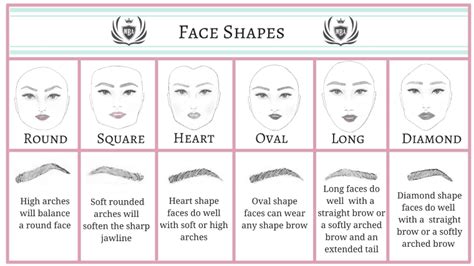Introduction
Your eyebrows play a pivotal role in framing your face and defining your features. Perfectly shaped brows can accentuate your eyes, enhance your facial symmetry, and boost your confidence.

Determining Your Face Shape
The first step in shaping your brows is to determine your face shape. There are several common face shapes:
Oval
- Longer than it is wide
- Smooth, symmetrical curves
- Forehead is slightly wider than the chin
Round
- Short and wide
- Full cheeks and a rounded chin
- Similar width and length
Square
- Angular and defined jawline
- Forehead and chin are equal in width
- Strong, sharp cheekbones
Heart
- Wide forehead
- Narrow chin
- Widow’s peak
Diamond
- Narrow forehead and chin
- Wide cheekbones
- Sharp angles
Choosing the Right Brow Shape
The ideal brow shape for your face depends on its shape. Here are some general guidelines:
Oval Face
- Arched or slightly rounded brows
- Avoid overly angled or flat brows
Round Face
- Angled or high-arched brows
- Avoid rounded or straight brows
Square Face
- Soft, rounded brows
- Avoid thin or severely angled brows
Heart Face
- Arched brows with a slightly higher arch
- Avoid overly angled or flat brows
Diamond Face
- Straight or slightly arched brows
- Avoid rounded or overly angled brows
Brow Shaping Techniques
There are several techniques you can use to shape your brows:
Tweezing
- Pros: Precise, long-lasting results
- Cons: Can be painful, requires regular maintenance
Threading
- Pros: Natural-looking results, less pain than tweezing
- Cons: Requires a skilled technician, can break hairs
Waxing
- Pros: Quick, removes multiple hairs at once
- Cons: Can cause irritation, requires professional application
Sugaring
- Pros: Gentle on the skin, all-natural ingredients
- Cons: Can be time-consuming, requires a skilled technician
DIY Brow Shaping
If you prefer to shape your brows yourself, follow these steps:
- Cleanse: Remove any makeup or oils from your brows.
- Brush: Brush your brows upwards with a spoolie.
- Map: Use a brow pencil or ruler to determine the ideal shape for your face.
- Remove: Tweeze, thread, or wax hairs outside the mapped-out shape.
- Trim: If necessary, use brow scissors to trim any long or unruly hairs.
- Set: Apply a brow gel or pomade to hold your brows in place.
Professional Brow Shaping
For more precise and long-lasting results, consider visiting a professional brow technician. They can assess your face shape, determine the best brow shape for you, and perform the shaping flawlessly.
Tips and Tricks
- Don’t overpluck: Over-plucked brows can take months to grow back.
- Shape gradually: Remove only a few hairs at a time to avoid overdoing it.
- Use magnification: A magnifying mirror can help you see your hairs more clearly.
- Experiment: Try different brow shapes to find the one that suits you best.
- Use a stencil: Brow stencils can help you achieve a symmetrical shape.
Frequently Asked Questions
Q: How often should I shape my brows?
A: It depends on your individual hair growth rate. Most people need to shape their brows every 3-4 weeks.
Q: Can I shape my brows if I have thin or sparse brows?
A: Yes, but it’s important to be careful not to remove too many hairs. Consider using a light touch and focusing on filling in sparse areas with a brow pencil.
Q: What’s the difference between arched and high-arched brows?
A: Arched brows have a subtle curve, while high-arched brows have a more dramatic arch.
Q: Can I dye my brows?
A: Yes, but it’s important to choose a professional brow dye that is specifically formulated for brows.
Conclusion
Proper brow shape can transform your appearance. By following the guidelines in this guide, you can shape your brows to perfectly complement your face shape and enhance your natural beauty. Remember, it’s a gradual process that requires patience and practice.
